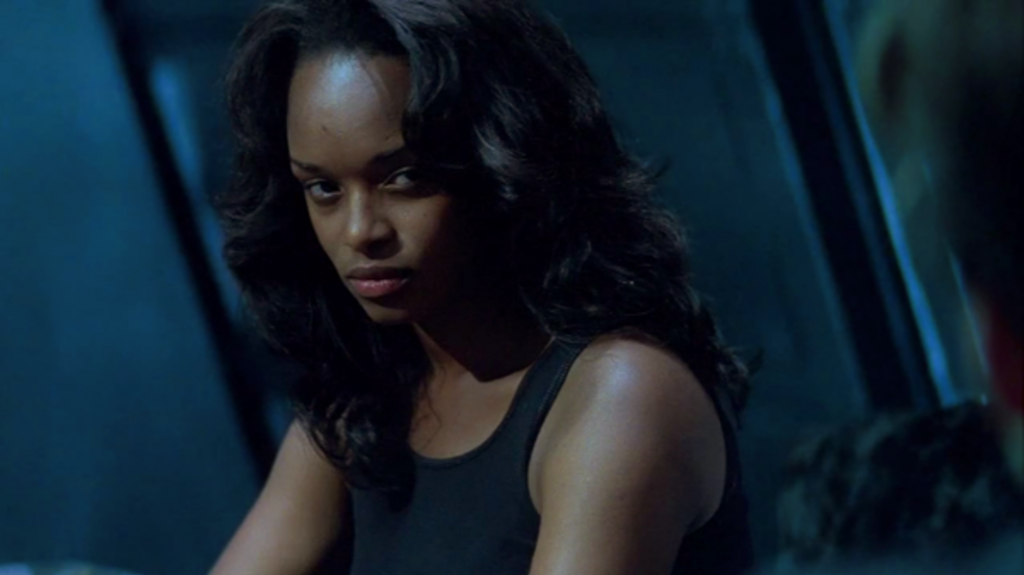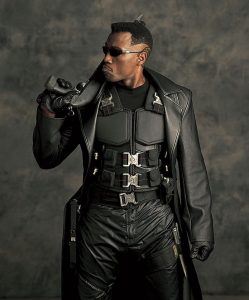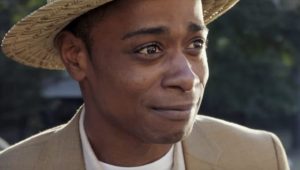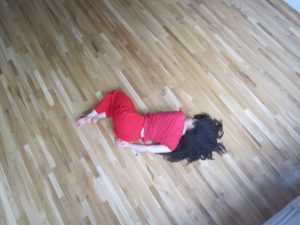Capitalism, Vampires, Unrest By Angie Pittman
April 8, 2020
Capitalism, Vampires, Unrest was written by Angie Pittman in conversation with the Platform 2020 Kin & Care Research Group before the COVID-19 pandemic escalated in the U.S. and New York City. Through the frame of the 1998 Sci-Fi cult classic, Blade, Angie’s critical film analysis points to racial disparities and gendered expectations within American systems of care and histories of labor. Set in a landscape of fear, Pittman asks us to consider the role of the Black vigilante within a vampiric, white-supremacist-imperial-capitalist patriarchy. In this time, some in our society are required to stay at home and others are put in harm’s way without the proper protections in place. Pittman suggests the concept of rest as inherently political — a human right manufactured into a privilege, not awarded to all. She reminds us that the protagonist of the film, an “invincible” Black superhero (Blade), never sleeps and is immune to death or destruction and fights day and night, to protect and serve a society in which he is an outcast. Angie’s critical read of the supporting character, Hematologist, Dr. Karen Jenson, can also invite us to look deeper into the insidious implications behind work – what kind of labor is considered essential and what populations overwhelmingly are expected to take on that labor? Whose bodies are in demand, to stand on the front lines of imminent threat? Who is sacrificed when we speak of risk and reward, times of war, consumption, and heroics?
– Seta Morton (Editor and Assistant Curator)
Capitalism, Vampires, Unrest
by Angie Pittman
In 1998, the Black American Actor, Wesley Snipes, starred in one of the most notable films of his career, David S. Goyer’s Blade. The film tells the story of Blade, a human with “vampire strengths but none of their weaknesses,” who protects other people from vampires. The film stars Snipes in the title role with Stephen Dorff, Kris Kristofferson, Sanaa Lathan and N’Bushe Wright.
Released on August 21, 1998, Blade became a commercial success by grossing over $70 million at the U.S. box office, and more than $131 million worldwide. Despite mixed reviews from critics, the film received a positive reception from audiences and has since garnered a cult following.
Enter Angie Pittman: In my formative years, I was a Black nerd and weirdo. I loved being alone, was really good at “doing school,” and did shit like perform and re-stage my favorite songs of The Little Mermaid in Photo Booth in my free time. I found rest in Black iconography. I didn’t really see my whole self reflected in those around me in church, at home, and at school. I found affirmation in certain representations on screen, and Blade is one of those icons.
The film is notable because of what it added to the conversation around Black people, superheroics, relationships, and what it means to be in-service on the big screen. That same year the following films were released: Belly (featuring Nas and DMX), Beloved (starring Oprah Winfrey), How Stella Got Her Groove Back (which I was not allowed to watch at the time. Starring my namesake, Angela Bassett), The Player’s Club, written and directed by Ice Cube, Why Do Fools Fall in Love (Starring Halle Berry, Vivica A. Fox, Lela Rochon, and Larenz Tate), I Still Know What You Did Last Summer (I mention this only because of the performances of Brandy and Mekhi Phifer), and Down in the Delta (by Maya Angelou. Starring Alfre Woodard, Al Freeman, Jr., Esther Rolle, Mary Alice, Loretta Devine AND Wesley Snipes himself).
What a vast and rich year for Black entertainment and cinema. I see a commonality. In all of these films there is some sort of unrest, displacement, and, in language borrowed from Jordan Peele, all of these films were inside of, or fighting against, the “sunken place”. Blade out of all of these offered what I now see as an afro-pessimist compliment to the canon. He was surrounded and almost engulfed, but still fighting the evils of vampirism as a single comrade.
…Speaking of unrest and rebellion.
I think about the ’60s a lot. [I think this is for a lot of reasons, but a few include it being my parent’s formative years, my continual inspiration from the Black Arts Movement, and seeing the policing and surveillance culture as an example of a New Nadir ]
…After the ’60s comes the ’70s
…And hello Blaxploitation films.
…And we have to talk about Blacula. It was one of the early Blaxploitation films and the first insert of Black people into the vampire film canon. Blacula addresses the transatlantic slave trade and #Blacklove before it was a hashtag. The opening scene begins with Prince Mamuwalde (before he becomes Blacula) at Castle Dracula in Transylvania 1780, attempting to come to an agreement (accompanied by his highly esteemed wife Luva) explicitly advocating for the humanizing of people of African descent. This resulted in Mamuwalde speaking deep truth, an incredibly choreographed fight scene, and the unfortunate capture and turning of Mamuwalde.
…I think this isn’t about unrest/rest anymore. It’s about consumption. And life. And death. But when I say it like that, it’s all about rest.
I am a very sleepy person. I would always rather be sleeping. But this isn’t about me, this is about Blade. or wait, what is this about?
Transatlantic slave trade. my body and its blood.
vampirism. consumption. capitalism. blood thirst.
this is about situating the movie Blade in a conversation of Black rebellion and unrest.
Now, This movie is a lot of things, but it’s not everything. The misogyny alone is rampant. So I decided to make a list of all the good things and leave the rest. The thing about vampires is that what drives them is their most basic need. I think it’s hurtful and generally unhelpful to make generalizations about large populations of beings but in this case, maybe it’s fine. Folklore is a compilation of people’s ideas around a particular place or group of people. Which is a specific truth and makes for wonderfully malleable metaphors.
Vampires’ hunger is based on the consumption of the blood and life of others. I think also what drives them is the fear of extinction. What’s important about Blade is that he’s a daywalker. You can see the movie to understand why that’s important but he was infected in utero (his mother was bitten while she was pregnant with him). What makes him such an effective killer of vampires is that he is one of them. In the world but not of the world. He’s an intermediary…like Jesus…or whatever…
So what can we learn from Blade the vampire?
- Blade never sleeps and Black people should always sleep. In fact, we are owed sleep.
His main power is that he is a vampire. He can withstand daylight and not be wounded. So he can slay all day. I mean to say, he can work to support the cause which is slaying vampires (white supremacist imperialist capitalist patriarchy) around the clock, without limits according to him having to hide from the sun, but the rhyme “slay all day” sounded cute at the time. The contemporary filmmaker Nikyatu Jusu (maker of Suicide by Sunlight) has a reason for this: our melanin. Most vampires sleep during the day in their coffins or canopy beds. Blade never sleeps. Which leads to my next point…
- Black vampires do a lot.
Prince Mamuwalde (aka Blacula) was an ambassador to his country, talked about racism openly, and believed deeply in #Blacklove.
Blade was born a human with vampire strengths, avenged his mother’s death, and was a single handed fighter versed in many martial arts forms.
Valentina, the protagonist in the film Suicide by Sunlight is a nurse, a single mother, and a bad ass.
- The tools of the oppressor can also be the weapons of the revolution.
- Costuming is important for the revolution.
Have you seen Blade’s use of leather? To quote Blacula, “That’s a bad cape. I’d like to have that cape”.
- KAREN is the Black femme savior that this movie needed.
I am also calling her the “only person with sense” in this movie.
So, Karen…you know… Karen is Karen…
In the context of the movie Dr. Karen Jenson is a hematologist who is bitten by a vampire.
It took me a moment to recognize Karen’s labor in this movie. Originally I was like, “Oh yeah, of course she’s doing the most.” “The most” being that she finds a cure for vampirism, cures herself, and researches a cure for Blade’s particular strain of vampirism. She rides out with Blade to multiple confrontations with vampires, creates the serum that ultimately vanquishes Blade’s primary enemy, Deacon Frost, (who wants to conquer the human race) and the list goes on.
And then I’m like, wait a minute, what? Why is she STILL around?
Karen is a Hematologist. Once she quickly figured out a cure for herself after being bitten, she could have dipped out.
Like, that could be the movie: Karen gets bit, Blade saves her, she heals herself. Done. Instead, she stays and keeps working. I took her labor for granted and the film obviously takes her for granted. I had to recognize that every step of the way, what she did was a choice yet it is not presented as a choice, it’s presented as an obligation. And aren’t we all trained to take a Black woman’s labor for granted? It’s almost as if, as a Black femme in this movie, her labor couldn’t stop with just her healing herself, but is only made worthy by putting it towards the patriarchy/Blade.
So yeah, Karen.
Who would Karen be if she wasn’t laboring? That’s the sequel I want to see.
In one of the final scenes of the movie, Blade is drained of his blood, but Karen allows him to drink from her, causing him to recover in order to keep fighting. Karen gives her blood so that Blade can live.
Sacrifice.
I’m not about this specific archetype and I don’t think that this is inspirational in any way. What I am saying is this is a good opportunity (whether you’ve seen the movie or not) for us to tune our eyes in order to recognize the labor of Black femmes that we have been socially taught to take for granted.
- VANESSA, Blade’s mother, is an example of someone in the “sunken place.”
It’s hard to talk about Blade’s mother, Vanessa, without talking about white supremacy and capitalism.
The wide, 18 wheeler, metaphorical turn here is: I am locating vampires in the conversation of white supremacy and capitalism. Capitalism being an economic system based on private ownership of the means of production and their operation for profit which historically has benefited from the bodies, life, and blood of people of color and specifically Black people, in this country. Vampires are a folkloric example; a network of beings that sustain themselves through the consumption of others’ blood.
So, when I think about the much needed conversation around Blade’s mother, I see her being a product of this consumption, and how everything from the start of her entrance into the movie was basically her already being a victim of the system. She was already gone the moment she was bit.
Vanessa was a shell of what she once was. So I can only be mad at the system that took her. But it is confusing because you look at her face, in the movie, and it is a face you recognize, but it’s not her.
Christina Sharpe says “Living in the wake means living the history and present of terror, from slavery to the present, as the ground of our everyday Black existence; living the historically and geographically dis/continuous but always present and endlessly reinvigorated brutality in and on our bodies while even as that terror is visited on our bodies the realities of that terror are erased.”[1]
It’s so complicated. It’s complicated because it is two sides of the same coin with Karen and Vanessa. One being overly labored and the other being completely lost. Maybe one leads to each other.
But I think a basic reading of Blade’s relationship to his mother is “mommy issues”. It’s not mommy issues because she’s not his mother. Vanessa was a vampire with the face of his mother. She became someone who was completely consumed by capitalism as a tool for Deacon Frost’s empire. If Blade had just named it and recognized that, it could have changed the trajectory of the movie. His inability to recognize the systemic operations was the demise of him.
7. Fear of extinction often leads to the erection of a god, demagogue, or monument.
8. Self care and support for Blade was emergent and changing.
He wasn’t living a particularly sustainable life, but I believe he was living the life he needed/wanted as a result of the intense systems that he was born into. There is something about his alone-ness in support of the collective fight that feels close to home. Collectivity and revolution. Blade has kin, Whistler (Blade’s mentor and weaponsmith), Karen (we know Karen), and his brother-like serum provider who he often visits to ground himself. There is both alone-ness and collectivity that are needed in the revolution. I need both too.
I’m really good at tangents and really bad at offering conclusions so I’ll stop this for now and end with words from some people I admire listening to.
Again, Christina Sharpe says “Living in the wake means living the history and present of terror, from slavery to the present, as the ground of our everyday Black existence; living the historically and geographically dis/continuous but always present and endlessly reinvigorated brutality in and on our bodies while even as that terror is visited on our bodies the realities of that terror are erased.” [1]
Writer, director, and filmmaker Nikyatu Jusu says “[The] Horror[genre] is something that people are paying more attention to right now. We are living in the midst of a real-life horror film and it is making the genre seem more appealing”. [2]
I would add, The horror is here and it has always been here; listen with your whole body to those that give you life.



